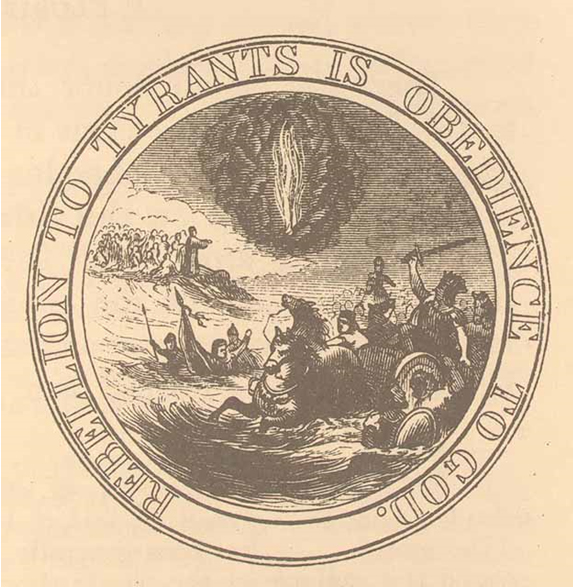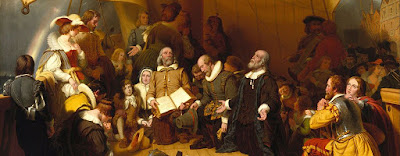 |
| In 1776, Thomas Jefferson, Benjamin Franklin, and John Adams proposed this image for the Great Seal of the United States. The image depicts Pharaoh’s army drowning as Moses closes the Red Sea upon them, while the pillar of fire guides God’s chosen people. The motto suggests that Moses’ actions (and those of the American Revolutionaries) were sanctioned by God. Source: Library of Congress. |
By Richard Gardiner - Posted at the Journal of the American Revolution:
Though the events transpired almost a quarter of a millenium ago, the shelves down at the local Barnes & Noble bookstore routinely continue to display freshly researched, written, and published histories of the American Revolution, the founding fathers, and the genesis of the United States.
[1] Yet there remains an element of the American founding era that is routinely underrepresented in these volumes—the role of religion. It is a factor of the Revolution that many historians minimize. The revolution, they maintain, was essentially secular in nature.
But “No understanding of the eighteenth century is possible” warned Carl Bridenbaugh, “if we unconsciously omit, or consciously jam out, the religious theme just because our own milieu is secular.”
[2] Yet, as Kevin Phillips remarked, “Historians and commentators in the late twentieth-century United States have shrunk from emphasizing religion in their explanations of seventeenth and eighteenth century affairs.”
[3] Phillips argued that this is a gross error insofar as “any serious investigation of the patterns of rebellion and loyalty during the 1775-1783 fighting in the United States leads to religion.”
[4]
No one recognized this better than the foes of the American revolutionaries. Ambrose Serle, secretary to British General Howe in New York City, wrote to the British Secretary of State in 1776 telling him that the American Revolution was ultimately
a religious war.
[5] Serle’s insights are perhaps worthy of special consideration given his privileged vantage point. In light of his intelligence, education, broad perspective, and eyewitness status, Serle’s observations compel historians to incorporate his perspective into a comprehensive understanding of the conflict. Serle’s biographer, Edward Tatum, Jr., who wrote the introduction to Serle’s
Diary put it in these terms:
Serle was no ordinary observer but one whose training and philosophy gave point to his opinions and coherence to his judgments. In addition, his unique position as a civilian in intimate association with Lord Howe afforded him an unusual opportunity to see more than one aspect of a complicated situation.[6]
Continue reading...






Comments
Post a Comment
Welcome! Please feel free to comment, but anti-Christian comments or profanity will not be tolerated. Thank you, ed.